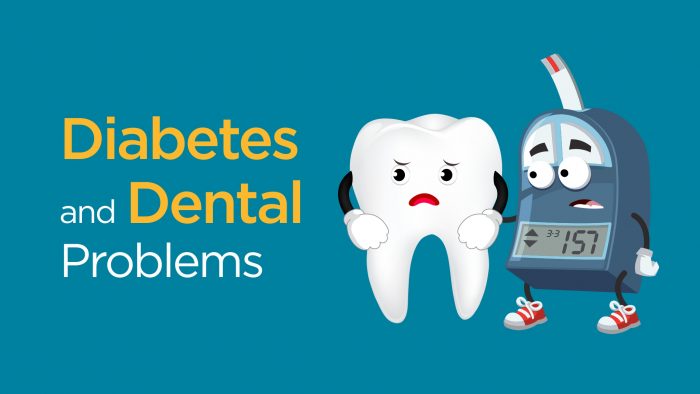Diabetes and Dental Problems
September 3, 2021
There is a well-known link between diabetes and dental problems, eg. Gum disease. Most of the time, a patient having any type of diabetes will have some or the other form of oral manifestations of diabetes.
You may have wondered why dentists, when performing your dental evaluation, ask you about your medical history. Especially that of diabetes and high blood pressure. This is because a systemic disease like diabetes will have an effect on your dental health. And it is important to know whether you have diabetes, for a proper diagnosis of your dental problems.
What is Diabetes?
Before we look at the effects of diabetes on oral health, is it important to understand what diabetes is. When we eat food, our digestive system breaks it down into sugars and starch, and these sugars are absorbed into our circulation from the small intestine. The point of introducing these sugars into our circulation is to transport them to the various parts of our body, and allow cells to absorb them for energy. This absorption is facilitated by a hormone called insulin.
Let us look at some of the common dental problems that are associated with diabetes.
Gum Disease
One of the most common outcomes of diabetes is gum disease. Diabetes reduces the body’s ability to fight bacteria. If the plaque that is accumulated around your teeth is not cleaned regularly via brushing and flossing, the millions of bacteria within plaque cause the gums to swell and inflame, leading to a condition called gingivitis. Gingivitis is an early gum disease and can be treated easily if oral hygiene is restored.
However, if the diabetes is not taken care of and the plaque is not removed, gingivitis can give rise to further loss of bone and supporting structures around the tooth. This condition is called periodontitis, and this can eventually lead to loosening of teeth.
Tooth Decay
In diabetes, sugar levels in the blood are high, and this means that these sugars are also in high supply in your mouth. The mouth contains lots of bacteria, which attack these sugars and form acids in the process. These acids eventually lead to tooth decay and cavities. Thus, a diabetic person may have greater incidence of tooth decay and cavities.
Oral Thrush
Microbes like bacteria and fungi always have an opportunity to infect tissues when sugar levels are high. This is often the case most in diabetes. Hence, diabetic individuals also sometimes exhibit a fungal infection of the mouth called oral thrush or candidiasis. Thrush manifests as red or white patches on the tongue, or mucosa of the mouth.
Dry Mouth
Dry mouth or xerostomia is a condition where production of saliva is reduced in the mouth, leading to a mouth that feels dry. Adequate saliva in the mouth cleanses the teeth and gums, and a lack in saliva can give rise to tooth decay and gum disease.
Diabetes has significant oral manifestations that can sometimes require treatment like scaling and root planing, or in more severe cases, flap surgery. But it is important that the sugar levels and diabetes are controlled by medication first.



















































